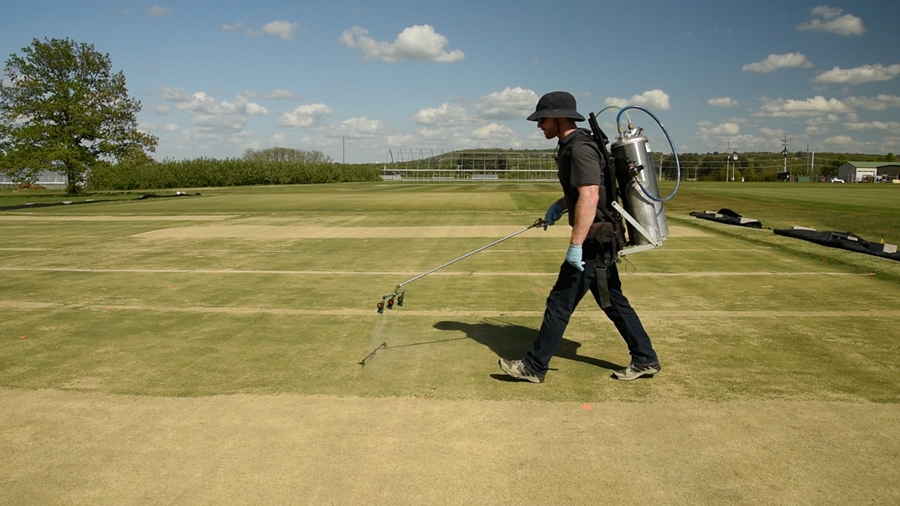FAYETTEVILLE, Ark. – Golfers who like to hit the links on warm winter days could see more playing time thanks to turfgrass research done by the University of Arkansas System Division of Agriculture and the Dale Bumpers College of Agricultural, Food and Life Sciences.
Eric DeBoer, a graduate student in the Horticulture Department, studied the relationship between temperature and use of covers on ultradwarf Bermudagress putting greens, as well as the effects of wetting agents on green up.
Mike Kenna, research director for the USGA, the primary funder for the study, said the organization was very pleased with the research.
"The results will give superintendents better information on the low temperature threshold for applying the covers," he said Thursday. "This will help reduce the number of covering events, save labor costs, and increase days the golf course is open for play. "
The research is important for courses in the transition zone, a climate belt that's ideal for neither warm nor cool season grasses. Northern Arkansas is in the transition zone and DeBoer wanted to see how low the threshold temperature for covering greens could go. While covering greens protects them from cold weather damage, it also prevents play and requires more manpower to deploy and remove, adding to the course's operating costs.
He tested Champion, TifEagle and MiniVerde using covers at 25 degrees, 22 degrees, 18 degrees and 15 degrees, and also had control plots that remained uncovered.
The results were surprising to DeBoer.
"Initially, I thought we'd be able to lower the temperature threshold a little bit, but I didn't think that we would see the results that we saw," he said. "Even at 15 degrees, it was very comparable to the plots covered at 25
"Maybe it's best to just keep covering at 25 degrees as an insurance policy," he said, but in cases where the course "can't afford to keep a big crew of people on to go out and place covers and remove them," adding that the research suggests that superintendents can lower the cover temperature and not see any detrimental effects in the spring.
Among the three turf cultivars, Champion, saw significantly more winter injury than did TifEagle and MiniVerde.
He also found applying a late-season wetting agent — an application that helps water penetrate the soil — improves spring green up.
The research was conducted with professors Mike Richardson and Doug Karcher, and program technician John McCalla.
Additional support for the research came from the Arkansas Turfgrass Association and the Arkansas Chapter of the Golf Course Superintendents Association of America.
A video describing the research and its conclusions is available here: bit.ly/Greens-Cover and bit.ly/2fPPXvV.
For more information about the turfgrass program, visit the horticulture turfgrass site.
About the Division of Agriculture: The University of Arkansas System Division of Agriculture's mission is to strengthen agriculture, communities, and families by connecting trusted research to the adoption of best practices. Through the Agricultural Experiment Station and the Cooperative Extension Service, the Division of Agriculture conducts research and extension work within the nation's historic land grant education system.
The Division of Agriculture is one of 20 entities within the University of Arkansas System. It has offices in all 75 counties in Arkansas and faculty on five system campuses.
The University of Arkansas System Division of Agriculture offers all its Extension and Research programs to all eligible persons without regard to race, color, sex, gender identity, sexual orientation, national origin, religion, age, disability, marital or veteran status, genetic information, or any other legally protected status, and is an Affirmative Action/Equal Opportunity Employer.
Topics
Contacts
Mary Hightower, director, communication services
U of A System Division of Agriculture
501-671-2126,
